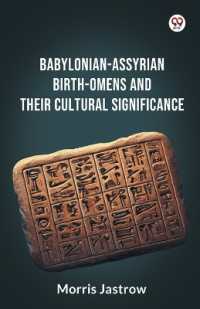Full Description
Constitutional law provides the legal framework for the Australian political and legal systems, and thus touches almost every aspect of Australian life. The Handbook offers a critical analysis of some of the most significant aspects of Australian constitutional arrangements, setting them against the historical, legal, political, and social contexts in which Australia's constitutional system has developed. It takes care to highlight the distinctive features of the Australian constitutional system by placing the Australian system, where possible, in global perspective.
The chapters of the Handbook are arranged in seven thematically-grouped parts. The first, 'Foundations', deals with aspects of Australian history which have influenced constitutional arrangements. The second, 'Constitutional Domain', addresses the interaction between the constitution and other relevant legal systems and orders, including the common law, international law, and state constitutions. The third, 'Themes', identifies themes of special constitutional significance, including the legitimacy of the constitution, citizenship, and republicanism. The fourth, 'Practice and Process', deals with practical issues relevant to constitutional litigation, including the processes, techniques, and authority of the High Court of Australia. The final three parts deal with the structural building blocks of the Australian Constitutional system: 'Separation of Powers', 'Federalism', and the 'Protection of Rights.'
Written by a team of experts drawn from academia and practice, the Handbook provides Australian and international readers alike with a reliable source of knowledge, understanding, and insight into the Australian Constitution.
Contents
Anthony Mason: Foreword Adrienne Stone and Cheryl Saunders: IntroductionPart I: Foundations 1: Sean Brennan and Megan Davis: First Peoples 2: John Waugh: Settlement 3: Susan Crennan: Federation 4: Anne Twomey: Independence 5: Susan Kenny: Evolution 6: Patrick Emerton: IdeasPart II: Constitutional Domain 7: K M Hayne: Rule of Law 8: William Gummow: Common Law 9: Gabrielle Appleby: Unwritten Rules 10: Stephen Donoghue: International Law 11: Stephen Gageler: Comparative Law 12: Gerard Carney: State ConstitutionsPart III: Themes 13: Brendan Lim: Legitimacy 14: Elisa Arcioni: Citizenship 15: Lisa Burton Crawford and Jeffrey Goldsworthy: Constitutionalism 16: John Williams: Republicanism 17: William Gummow: Unity 18: Hilary Charlesworth: Australia in the International Legal OrderPart IV: Practice and Process 19: Kristen Walker: Authority of the High Court of Australia 20: Adrienne Stone: Judicial Reasoning 21: Susan Kiefel: Standards of Review 22: Jeremy Kirk: Justiciability and Relief 23: Peter Hanks and Olaf Ciolek: Techniques of AdjudicationPart V: Separation of Powers 24: Amelia Simpson: Parliaments 25: Terence Daintith and Yee-Fui Ng: Executives 26: Cheryl Saunders: Legislative and Executive Power 27: Nicholas Owens: Judicature and Jurisdiction 28: Michelle Foster: Separation of Judicial Power 29: Debbie Mortimer: Constitutionalization of Administrative LawPart IV: Federalism 30: Nicholas Aroney: Design 31: Mark Leeming: Power 32: Stephen McLeish: Money 33: Robert French: Co-operation 34: Justin Gleeson: Economic Union 35: Michael Crommelin: Federal Principle 36: James Stellios: Federal JurisdictionPart VII: Rights 37: Scott Stephenson: Rights Protection in Australia 38: Fiona Wheeler: Due Process 39: Adrienne Stone: Expression 40: Joo-Cheong Tham: Political Participation 41: Lael Weis: Property 42: Carolyn Evans: Religion 43: Denise Meyerson: Equality 44: Dan Meagher: Legality





